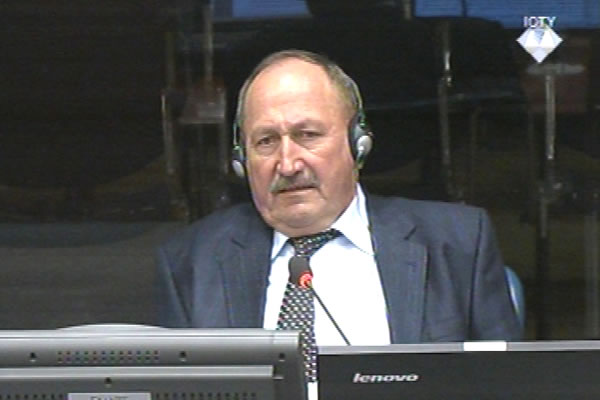Home
MARKALE 1 COMMISSION: PHANTOM OR REAL?
The prosecution alleges that the shell that hit the Markale market in Sarajevo on 5 February 1994 was fired from the positions held by Slavko Gengo’s battalion. Gengo’s deputy Milorad Dzida corroborated his erstwhile superior’s claim that a commission was set up, comprising VRS officers and UNPROFOR staff, and that the commission concluded the Serb troops were not responsible for the incident. The prosecution argues the commission was never established at all
 Milorad Dzida, defence witness at Rako Mladic trial
Milorad Dzida, defence witness at Rako Mladic trial Milorad Dzida, deputy commander of the 7th Battalion in the 1st Romanija Brigade, which was part of the Sarajevo-Romanija Corps, testified in the defense of Ratko Mladic. Following in the footsteps of the previous defense witnesses, in his statement to the defense team Dzida made some general claims to the effect that the BH Army had the upper hand in the Sarajevo theatre of war, and that the Bosnian Serb Army engaged only in defensive actions against the enemy, never targeting civilians in the city. In his statement, Dzida also denied that his unit was responsible for the massacre at the Markale town market on 5 February 1994. A single shell hit the market area, killing 66 and injuring about 140 citizens of Sarajevo.
As Dzida recounted, the day after the incident he was escorting a joint commission, which comprised the VRS and UNPROFOR personnel. The commission purportedly concluded that the shell hadn’t been fired from the Serb positions at Mrkovici. Some days later, Dzida explained in his statement, an UNPROFOR team came to carry out a regular inspection. An unnamed French major said that the ‘7th Battalion didn’t have anything to do with the Markale incident’.
As the witness said, he heard about this claim made by the French major from the interpreters. When the presiding judge asked him what language the interpreters were interpreting from, the witness said ‘I don’t know much about languages’, adding that he spoke ‘only Serbian’. He immediately contradicted himself, stating in the manner of a true linguist, that one of the UNPROFOR officers ‘spoke English with a Russian accent’.
In the cross-examination, the prosecutor put it to the witness that no ‘joint commission’ ever existed, and neither did the statement made by the unknown French major. The prosecutor asked the witness if he could give him the name of a single person from the VRS Main Staff, the Sarajevo-Romanija Corps, UNPROFOR, or indeed his brigade, who had been part of the alleged commission. Dzida initially said ‘no’ three times, but was then able to recall that Captain Mile Pajic and a sergeant by the name of Jakovljevic were members of the commission from his unit. Pajic has passed away.
Slavko Gengo, the commander of the 7th Battalion, also testified about the ‘joint commission’ two days ago at Ratko Mladic’s trial. In light of the almost identical written statements and answers the two witnesses gave in court, the prosecutor tried to establish if regular communication between the witnesses had anything to do with that. Dzida admitted that both he and Gengo talked to the representatives of Mladic’s defense in Pale in October 2013. They both signed their respective statements on the same day, 10 May 2014, Dzida said, but he explained that the two of them weren’t together in the office: they met in the corridor. Gengo and Dzida then met again at the Belgrade airport and took the same flight to Holland, although they were not seated together. Dzida also admitted that he and Gengo socialized even when they were not forced to do so because of their court duties. As he explained, they were too busy to meet ‘more than four or five times a year, and then only briefly’. It is now up to the judges to decide if that was enough time for the witnesses to collude over their statements, i.e. whether they made sure their statements tallied as they were making them, before they arrived in The Hague. The judges will of course reveal their findings on this issue in the judgment, not before.
The judges had to wait until the end of Milorad Dzida’s testimony to hear the most cogent version of his theory on what happened at Markale. As he was questioned by Judge Orie, Dzida said that he was ’100 per cent sure’ that the shell hadn’t been fired from the positions held by his unit. As he said, ‘I suspect that something had been planted’. Accidentally or not, Dzida’s commander Gengo presented the same theory two days ago: according to him, the incident had been ‘staged’. Dzida explained why he was so dead certain his unit was not responsible for the incident: several high-rise buildings offered cover for the Markale market, and furthermore, no shells could be fired without his and Gengo’s specific order.
Both witnesses have previously testified at the trial of Radovan Karadzic. The witnesses were warned at that time that the Tribunal’s rules allowed them not to answer any potentially incriminating questions. This time, they were not cautioned.
Linked Reports
- Case : Mladic
- 2014-05-29 WHO BROUGHT PRISONERS TO FRONTLINES
- 2014-05-28 ‘STAGED’ MASSACRE
- 2014-05-27 WITNESS: CIVILIAN CASUALTIES WERE COLLATERAL DAMAGE
- 2014-06-02 EVIDENCE ON EVENTS BEFORE AND AFTER PERIOD RELEVANT FOR INDICTMENT
- 2014-06-03 ‘MUSLIM SIDE RESPONSIBLE FOR POWER CUTS IN SARAJEVO’
- 2014-06-04 WHY AND HOW MUSLIMS LEFT PALE
